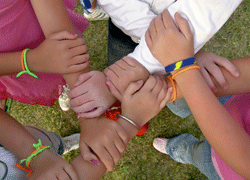So what attitudes, skills and knowledge do the children and young people in our places of learning today really need to become well informed, capable, fulfilled participants in 21st-century life?
The Millennium Resolution
Let’s go back to the start of the millennium and consider for a moment, the “Millennium Resolution”, which was prepared by Churches Together in England to encourage the whole nation to light a candle and join in a shared moment of national reflection on New Year's Eve 1999. The Millennium Resolution:
“Let there be
- Respect for the earth
- Peace for its people
- Love in our lives
- Delight in the good
- Forgiveness for past wrongs
And from now on
- A NEW START.”
This raises questions such as:
- To what extent is this resolution being achieved?
- What kind of role models are we for our young citizens?
- What do we value, personally, collectively, nationally?
Children of the ‘Noughties’
The “2000s” decade started on 1 January 2000 and ended on 31 December 2009. It was a decade in which the historical milestones of the 21st century and the 3rd millennium began, ie on 1 January 2001.
Wikipedia explains the reasoning behind the ‘Noughties’ name sometimes applied to this decade: The "noughties" is a play on words on "naughty" – bad behaviour, and "nought" an English word meaning nothing, or zero. The excesses of the decade are so succinctly expressed by the word, that it has become the only term for the decade in common use in the UK - see http://en.wikipedia.org/wiki/2000s (decade).
Many of our young citizens born during the Noughties are now experiencing PSHE education and Citizenship lessons. The legacy of the 2000s alone provides an abundance of extremely important topics for these children and young people to consider as they grow up, since many of the associated issues will have profound impacts on their lives. Take for example, the effects of the internet, scientific advances, new technologies, wars and terrorism, the environment, energy resources, climate change, natural and man-made disasters, the global financial crisis, population growth, social developments and various aspects of and influences arising from popular culture such as sports, music, the media, fashion and interactive entertainment.
Anchors while considering, debating, forming opinions and making choices
Values and attitudes change with time but if today’s children and young people are to lead fulfilled lives, from an early age, enlightened values education needs to be an ongoing, core part of their learning to enable them to become “fluent in values”.
Evidence the world over shows that explicit, systematic values education can help to improve attainment levels and develop essential capacities, including individuals’ emotional wellbeing, confidence and self-esteem, social competencies, their sense of belonging and connectedness, as well as communication skills conducive to rich and rewarding relationships. Participants’ well thought through values are likely to provide key reference points as they consider, debate, form opinions and make choices about matters and issues central to their lives, their communities and the world generally.


















